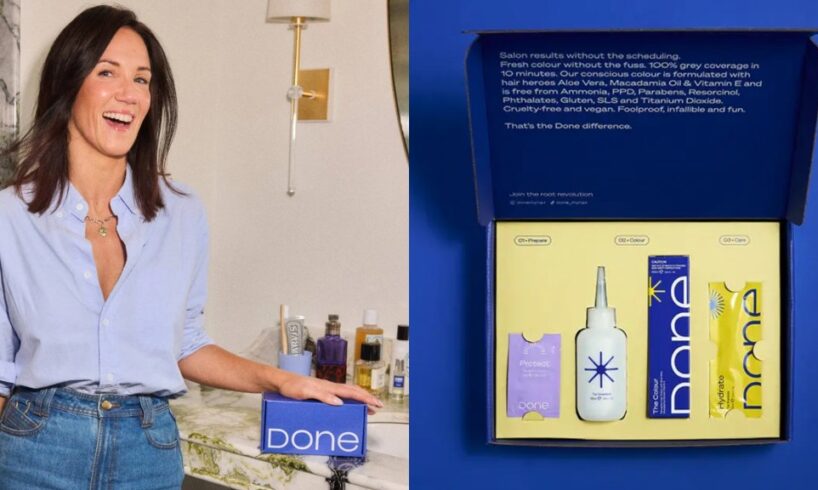
Serial entrepreneur Hannah Spilva has raised a pre-seed funding round, and already attracted interest from retail partners, for her new hair colour startup Done.
Spilva has spent the past two years researching and developing her new business, after selling LVLY, the disruptive flower delivery company she co-founded with Verity Tuck, for $35 million in 2022.
Done is focused on offering a new solution to an incredibly common problem: covering grey hairs in a cost-effective way.
Related Article Block Placeholder
Article ID: 234131
Grey hair is an inevitable part of ageing, says Spilva, and an estimated 80% of women turn to hair dyes after spotting their first grey. For many, this leads to regular visits to the hair salon, as often as every few weeks, or purchases from supermarkets and chemists.
The result, as Spilva describes it, is “one of the most compelling repeat purchases in beauty, in a market where there is no clear leader”.
Smarter business news. Straight to your inbox.
For startup founders, small businesses and leaders. Build sharper instincts and better strategy by learning from Australia’s smartest business minds. Sign up for free.
By continuing, you agree to our Terms & Conditions and Privacy Policy.
Done is aiming to become that leader, by offering premium, at-home hair dye kits for $65.
The company promises users their grey hair can be covered in 10 minutes using the hair dyes, which are vegan and cruelty-free and have been formulated in Milan, Italy.
Borrowing from the LVLY playbook, Done offers both one-off purchases and a customisable subscription model that allows for customers to time their deliveries with their hair growth cycle.
While Done has launched with a digital-first model, Spilva tells SmartCompany she is already in discussions with bricks-and-mortar retailers, after being approached by a number of potential partners.
The value of Done’s pre-seed funding round is undisclosed, however, Spilva says the investment has come from a group of high-net worth individuals who she counts as long-standing colleagues, mentors and advisors.
“No modern champion” for hair colour at home
Related Article Block Placeholder
Article ID: 287670
Spilva says she took a “relatively short” hiatus from the business world after LVLY was acquired by Limitless Technology, and admits she was under “the false impression that I never wanted to start another business again”.
But that quickly changed when she stumbled across a problem that she wanted to solve for herself.
“I was my own first customer in a way,” she says.
Launching a business in the hair colour space is an exciting prospect, says Spilva, as it represents “an opportunity to disrupt a stagnant category where there’s been very little innovation for decades”.
“If you look at the landscape in terms of supermarkets and chemists, they have been dominated by legacy brands with very little innovation, and at the same time, at the other end of the spectrum, you’ve got salons, which remain a pretty time intensive and costly option, and you’ve got this gaping void in between,” she says.
This is vastly different to the skincare and cosmetics space, adds Spilva, which has “exploded with premiumisation” and is home to an increasing number of independent and digital-first brands that are offering a new kind of customer experience.
“When you zoom out from that, hair colour is being completely left behind. There’s been no meaningful leap forward, no modern champion. And certainly in Australia, there’s no clear category leader.”
This view is informed by independent customer research, undertaken by Done over a six-month period, which Spilva says has helped the business determine its pricing strategy. At $65 for Done’s Ultimate Root Retouch Kit, it is priced higher than hair dyes available from supermarkets but significantly lower than a similar service at a hair salon.
Spilva and her team also looked closely at parallel product categories that involve high frequency treatments.
“Self tanning is a really good sort of parallel example of a product that used to be very salon-centric,” she explains.
“So people, 10 plus years ago, would typically go to a salon for that kind of treatment, whereas, thanks to product innovation, it’s become an enormous retail category of its own.”
Lessons from LVLY
There’s almost too many lessons from her experience building LVLY that Spilva will apply to Done, says the founder, but understanding the value of convenience stands out.
“The through-line, if you like, between LVLY and Done is that with LVLY, we really leaned into convenience as a strategic USP [unique selling point] that drove growth,” she explains.
“Convenience wasn’t just a delivery bolt-on to our core service; it was actually a core part of our DNA.
“And so with Done, we’ve built convenience directly into both the product and the tech.”
This plays out in both the quick process involved in using the hair dyes, as well as the ability to customise a subscription.
“The thing that we did at LVLY, which we’re also doing with Done, is we’re working hard to remove friction at every stage – not just at the point of purchase, but also by developing a product that fundamentally saves time, saves money, and works on your schedule,” adds Spilva.
“Convenience is the whole point.”





